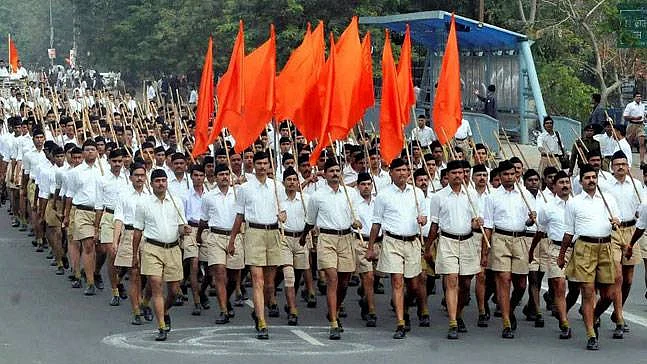RSS-BJP must bear in mind that India has a curious habit of springing surprises on the arrogant
On 75th year of independence, BJP should’ve tried to forget political differences of the past and herald a united future. Unfortunately, it made no attempt to affirm its faith in federalism

It might not be churlish to say that the celebration of the 75th year of Indian independence is more an official event associated with the BJP than a national occasion.
The fact that the BJP was ousted from Bihar while facing an angry opponent in Telangana showed that the festivities on August 15 would be held against the backdrop of political unrest undermining the BJP’s position.
In addition, the letter written by a number of former bureaucrats, judges and army officers against the disturbed conditions in Kashmir means that the BJP’s much trumpeted abrogation of the state’s (now a Union territory) special rights hasn’t paid the dividends that it expected.
Evidently, the hope in the Hindutva camp that the curtailment of Muslim-majority Kashmir’s autonomy will bring it closer to the Hindu-dominated mainland hasn’t been fulfilled. Instead, this “achievement”, which was expected to be the centrepiece of the celebrations on Independence Day, is unlikely to be seen as such.
What is clear, therefore, is that the 75th year of independence is being observed in a tentative, uncertain manner because the BJP is more or less alone in its celebratory mood. Only a few loyal allies outside the National Democratic Alliance led by it, notably the Biju Janata Dal of Odisha and the YSR Congress of Andhra Pradesh, are keeping it company.
This is not how it should have been. The 75th year of independence should have been a time for the BJP to bring together its friends and foes by forgetting the political differences of the past and heralding a united future. Unfortunately, the BJP made no attempt to underline its faith in federalism although it claimed at a recent Niti Aayog meeting that such togetherness marked the nation’s fight against the Covid pandemic.
That this assertion about the proximity between the Centre and the states is less than true is evident from the hounding of the Congress’s Nehru-Gandhi family by the Enforcement Directorate as well as the needling of the Arvind Kejriwal government by the Lt. Governor of Delhi, who is a BJP appointee.
As a result, the political atmosphere has become bitter enough to induce Congress leader Rahul Gandhi to call for another “do or die” agitation against a dictatorial regime. This reference to Mahatma Gandhi’s “quit India” ultimatum of 1942 to the British may act as a reminder of how the wheel has turned full circle where the freedom struggle is concerned.
It can seem odd that those who played little or no part in the independence movement and were accused of being behind the assassination of Mahatma Gandhi proudly claim to be patriots today while dubbing their opponents as anti-nationals. In no other country has there been such a dramatic reversal of fortunes in the post-colonial period.
To ensure that this upside-down interpretation of the events of the recent past replaces the existing version, history is being rewritten by the standard-bearers of the present ruling dispensation. They also believe that the BJP has ended one thousand years of “slavery” under the Muslims and the British and has ushered in a ‘new India’ which is rooted in its Hindu past.
There have even been calls by saffron groups in India to make Taj Mahal suffer the fate of the Babri masjid which was brought down in 1992.
It is understandable, therefore, why India is observing the 75th year of independence in a sullen mood. It is only the RSS-BJP which sees It as “Amrit Mahotsav”.
To the rest, it is a confirmation of a time when reckless iconoclasts are bent on moulding India in their own divisive saffron image which rubbishes the concept of a plural society based on a composite culture, highlighting India’s multi-religious, multicultural, multi-lingual and even multi-culinary heritage.
What we see, therefore, are two groups comprising people who have diametrically opposite views of India’s past and future claiming to represent the country on Independence Day. It is as if two Indias are vying with each other to claim the people’s attention.
The identities of the leading lights of the two Indias are not unknown. On the side of those extolling India’s diversity are the Mahatma and Jawaharlal Nehru while their ideological adversaries are V.D. Savarkar and M.S. Golwalkar.
The BJP’s electoral success may persuade it to believe that its assertion of what the country was and should be in the future has wider support than that of its opponents whose parties are derided by the BJP. But India has the curious habit of springing surprises, especially on the arrogant.
It is anybody’s guess how the BJP fares in this roller-coaster ride of Indian politics despite its claim to be able to rule for half a century. But a party which secured 31 per cent votes in the last national election cannot be too certain of its prospects.
(IPA Service)
Views are personal
Follow us on: Facebook, Twitter, Google News, Instagram
Join our official telegram channel (@nationalherald) and stay updated with the latest headlines
Published: 10 Aug 2022, 9:00 PM
